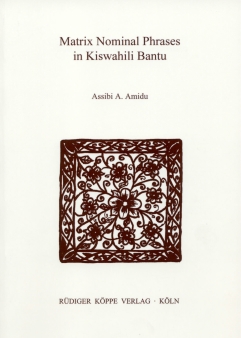
Matrix Nominal Phrases in Kiswahili Bantu
A Study of their Effects on Argument Syntax
Author: Assibi Apatewon Amidu. Series edited by: Wilhelm J.G. Möhlig †, Bernd Heine.
Series: GA Grammatical Analyses of African Languages Volume 34
200914 pp. Roman, 236 pp.
numerous tables and charts, index
Text language(s): English
Format: 170 x 240 mm
540 g
Paperback
€ 39.80
Buy 'Matrix Nominal Phrases in Kiswahili Bantu' as a downloadable PDF document directly from our online shop »
Order 'Matrix Nominal Phrases in Kiswahili Bantu' as print edition »
It appears that grammar textbooks, social studies, and the like, are taking up the space left by profound grammatical studies into Kiswahili Bantu syntax and morphology and, as a result, the native speaker’s syntactic idioms and usage are increasingly consigned to the backwoods of Kiswahili language description and may soon be forgotten. Today there is great interest in Kiswahili literature, culture, sociolinguistics, social anthropology and other applied subjects like globalization and technology, to name a few, without a comparable interest in formal Kiswahili syntax and morphology that go beyond basic language skills. These developments would seem to indicate that students, scholars and researchers assume that everything there is to know about Kiswahili grammatical structure has already been described and exhausted.
The data in this book reveal that such a conclusion is premature and hasty. The present study builds on earlier studies by the author and takes a closer look at complex nominal phrases (NPs) than was hitherto possible.
The book examines specifically the complex NPs of Kiswahili Bantu that function as matrix NPs. This is especially important because it appears that Swahilists, Bantuists and linguists tend to overlook the variety of NPs in Kiswahili Bantu in describing the languages of the world. Matrix NPs differ from ordinary NPs. The latter type normally has a single syntactic head, usually the external constituent or conjunct. The former type, however, has more than one agreeing head, and each behaves independently of the other in generating agreement markers.
The book, therefore, highlights the complex functions of matrix NPs in Kiswahili Bantu and its implications for argument syntax. This should give Bantuists and Linguists an insight into the kinds of syntax that Kiswahili grammar has in its repertoire.
Under these links you will find publications by the author, further analyses of Swahili grammar and of related Bantu languages and a review article by Kathrin Tiewa and a comment by the author:
Review in Afrikanistik online 2009
Comments by the Author in Afrikanistik online 2009
Accompanying material:
- Argument and Predicate Relations in Kiswahili
(ISBN 978-3-89645-042-5 ) - Classes in Kiswahili
(ISBN 978-3-89645-022-7 ) - Locative and Non-locative in Kiswahili Bantu
(ISBN 978-3-89645-713-4 ) - North-South Contributions to African Languages
(ISBN 978-3-89645-889-6 ) - Objects and Complements in Kiswahili Clauses
(ISBN 978-3-89645-560-4 ) - Pronouns and Pronominalizations in Kiswahili Grammar
(ISBN 978-3-89645-543-7 ) - Reflexive and Reciprocal Syntax Revisited
(ISBN 978-3-89645-707-3 ) - Reflexives and Reflexivization in Kiswahili Grammar
(ISBN 978-3-89645-028-9 ) - Semantic Assignment Rules in Bantu Classes
(ISBN 978-3-89645-703-5 )
Cross-reference:
- A Sketch of Swahili Morphology
(ISBN 978-3-927620-16-2 ) - Arbeitsvokabular Deutsch–Swahili
(ISBN 978-3-89645-981-7 ) - Bantu Languages
(ISBN 978-3-89645-705-9 ) - Domains and Regions in Bantu Tense and Aspect
(ISBN 978-3-89645-772-1 ) - Issues in Bantu Tonology
(ISBN 978-3-89645-033-3 ) - Les extensions verbales en swahili standard
(ISBN 978-3-89645-907-7 ) - Swahili Phonology Reconsidered in a Diachronical Perspective
(ISBN 978-3-927620-38-4 ) - Swahili-Handbuch
(ISBN 978-3-927620-06-3 ) - The Bantu Bibliography
(ISBN 978-3-89645-181-1 ) - The Bantu Languages of the Kenya Coast
(ISBN 978-3-89645-716-5 ) - Transitivity in Swahili
(ISBN 978-3-927620-37-7 ) - Transitivität und Verbvalenz im Swahili
(ISBN 978-3-89645-712-7 )
Reviews
Amidu has convincingly discussed complex paradoxies of matrix nominal phrases and agreement, and has succeeded in combining theory with wit.
Kathrin Tiewa in Afrikanistik online, www.afrikanistik-online.de/archiv/2009/2441, 1-4
| « back | Print version | [top] |
 Books
Books Audio
Audio Biographies
Biographies Series
Series Festschrifts
Festschrifts Journals
Journals